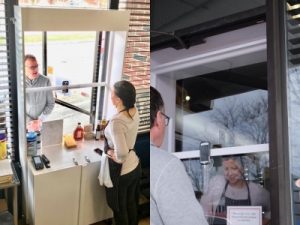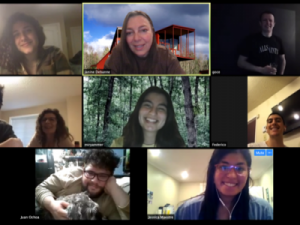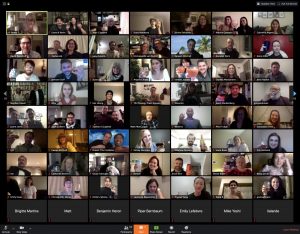STATEMENT of COMMITMENT + ACTION
Dear students,
There are important conversations taking place, within our school, across Turtle Island, and around the world. And I am listening. Many people are saying, “This time feels different.” But it will not be different unless we act boldly. Dismantling old structures is as important as introducing new ones; to address systemic racism requires clearing space within which systemic change can happen.
The discipline of architecture, the broader urban environment, and related academic institutions are not neutral. We must acknowledge the role that both practice and education have played in perpetuating racism within the fields of architecture and design. Policies advanced in the name of fairness and inclusion often instead reinforce structures of power that are rooted in white, Western assumptions – about knowledge, about the public sphere, about permanence as a virtue, and about how architecture transmits cultural meaning.
Words are powerful, but they can become hollow through overuse. This is what has happened with “thoughts and prayers” in the wake of gun violence, and with territorial acknowledgements at the opening of public events. (Let’s admit that nothing has yet been “ceded back”; structures of colonial power are as embedded as ever in the fabric of Canadian cities.) And our well-meaning commitment to Diversity, Equity, and Inclusion, while producing valuable shifts in university policy, and real successes in broadening opportunities and conversations across our institutions, now has a rhetorical flatness as well.
This is a long game, but too often when we acknowledge the length of these difficult transformative journeys, we dilute the sense of urgency. Reluctant to take risks, we allow things to move slowly. The will to act loses momentum until the next flashpoint, and still we wonder why history seems to repeat itself, again and again. So, as first steps, I have initiated the following:
DIVERSITY PLATFORMS WORKING GROUP
This group of faculty and students will generate ideas and actions for our school in support of social equity and systemic change. The group will have a budget to mount research activities, initiate events, and host forums that address both time-sensitive and long-range challenges. Representatives from this group will be in touch soon to announce the establishment of a webpage, and to let you how you can participate through various platforms.
PROFESSIONAL PRACTICE COURSE
This year, we are rewriting the teaching model for the Professional Practice core course for Master of Architecture students, while maintaining all aspects of the course that are necessary for professional accreditation. The class will be team-taught, and lead by Black and Indigenous practicing architects. Topics will address issues of equity and inclusion, not just in how to broaden access to opportunities within the profession, but also interrogating how the profession itself is complicit in constructing an unjust social landscape. Too often “resistance” and “activism” are relegated to the margins of sanctioned practice. The course will ask: How can activism instead operate upon the system itself from within, to more aggressively transform the rules of how we build, where we build, and for whom we build. In fall 2020, this required MArch course will also be open to fourth-year undergraduates, as a free elective.
FORUM LECTURES 2020 – 2021
Because of the provincial and university guidelines against large public gatherings, we will suspend the Forum lecture series for the coming academic year and replace it with a series of lectures and panel discussions around social equity in the built environment. The Diversity Platforms Working Group will be responsible for formulating the series and will reach out to students for suggested speakers.
BLACK & INDIGENOUS REPRESENTATION ON THE FACULTY
I continue to be committed to actively recruiting Black and Indigenous additions to our school’s permanent teaching staff, and to our roster of visiting professors and contract instructors. The faculty will seek out BIPOC scholars and teachers whose research and practice is directly connected with issues of social, spatial, environmental, and health justice (these are interdependent issues), who will contribute organically to dismantling outdated systems, and who will generate meaningful transformations to our curriculum.
FREQUENT & REGULAR CONVERSATIONS
Over the coming months, I pledge to be available often, at regularly scheduled times, to listen to student concerns. Particularly in our situation of physical distance, I want to ensure that “my door is open.” This can be separate from larger meetings organized by the Diversity Platforms group.
As I share my personal thoughts and convictions with you, I am also mindful of our school’s commitment to faculty governance. This is why we must develop meaningful conversations between a broad representation across the student body and the Faculty Board as a whole. I also have a deep respect for the most core principle of university teaching, which is academic freedom. Searching for consensus in our school’s goals is important; but the roads that lead there will be many and varied. We are without question, however, fully united and committed to the anti-racist work that this will entail. So in closing, I address you, our students, on behalf of the faculty:
We remain steadfast in our commitment to listening to your concerns, opening space for meaningful conversations, and taking action toward a more equitable school, city, and profession. We know many of you are angry, frustrated and exhausted, and we will fight for you to be heard. You are our focus – we will continue to work tirelessly to let your voices lead us as we work to help build a more just and inclusive world. These steps and actions are just the beginning.
Yours,
Jill Stoner, Professor & Director
Azrieli School of Architecture & Urbanism


